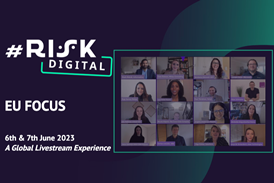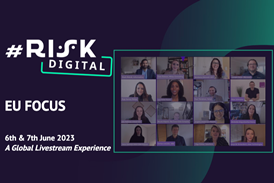Risk professionals and leadership teams need to stay ahead of the curve and understand the trends that will shape the future of risk. This article explores 10 key trends that Chief Risk Officers, business leaders and department heads need to be aware of in 2023 and beyond.
The world is changing rapidly, and with it, the risk landscape is evolving. As risk professionals, it is important to stay ahead of the curve and understand the trends that will shape the future of risk.
The UK’s Leading Risk Focused Expo
Complex regulatory requirements, emerging technologies, changing working practices, geopolitical uncertainty, ESG-related risks, high-interest rates – we are all facing a new and potentially challenging era. #RISK can help you navigate the complexities of the risk landscape.
#Risk London is here to empower you with the knowledge, insights, and connections you need to survive and thrive in a fast changing world of risk.
Don’t miss out on this opportunity to learn from the best and network with the brightest minds in risk.
This article will explore 10 key trends that risk professionals need to be aware of in 2023 and beyond. These trends are:
- The rise of cyber risk
- The increasing importance of data privacy
- The growing impact of climate change
- The emergence of new technologies
- The changing geopolitical landscape
- The rise of the gig economy
- The increasing importance of sustainability
- The growing focus on ESG
- The importance of risk culture
- The need for greater resilience
The rise of cyber risk
Cyber risk is one of the biggest threats facing businesses today. As the world becomes increasingly digitised, the number and sophistication of cyberattacks is on the rise.
In 2022, the average cost of a data breach reached an all-time high of $4.35 million. And the problem is only getting worse. According to Gartner, cyberattacks will cost businesses over $6 trillion annually by 2025.
Cyber risk is a threat to all businesses, regardless of size or industry. But it is particularly dangerous for businesses that rely heavily on technology and data. Chief Risk Officers Risk need to be aware of the latest cyber threats and take steps to protect their organisations. This includes implementing strong cybersecurity controls, educating employees about cyber risk, and having a plan in place to respond to cyberattacks.

AI and the new security landscape: securing your data
Roundtable: 19th October, 10:00am - 10:45
Join Alym Rayani, VP Security GTM at Microsoft, and industry peers in a roundtable discussion on preparing for the transformative shift in security, the future of productivity, and how data security is central to unlocking this potential for your organisation.
Hear and share insights, best practices, and learn from others who have begun this journey.
Speakers
- Alym Rayani, Vice President, Microsoft Security
The increasing importance of data privacy
Data privacy is another major concern for businesses today. As businesses collect more and more data about their customers, employees, and partners, they are also facing increasing scrutiny from regulators and consumers.
In 2023, we can expect to see even more stringent data privacy laws and regulations enacted around the world. Businesses will need to comply with these laws in order to avoid fines and reputational damage.
CRO’s need to develop a comprehensive data privacy strategy that includes measures to collect, store, and use data in a responsible and ethical manner. They also need to be transparent with their customers about how their data is being used.

Embedding privacy by design to enforce responsible use of data
Day 1: #RISK London, 18th October, 11:00 - 11:30 - Privacy & Data Protection Theatre
Privacy is no longer just about compliance, it’s about data. How can you unlock the value of data without compromising privacy or security?
Placing data responsibility at the core of your strategy is not merely a risk avoidance exercise, it’s key to data protection, fostering collaboration between privacy and data governance teams, and foundational to trust with customers.
The recent ISO 31700 Privacy by Design guidelines provide a framework for embedding privacy by design throughout the business.
In this session, we’ll discuss recent Privacy by Design guidelines and what this tangible guidance means for privacy programmes looking to evolve to beyond compliance to enforce responsible use of data. We’ll also hear from Zebra Technologies and how they embed Privacy by Design into their organisation, with real life examples and current challenges.
Speakers:
- Marco Mendes, Privacy Associate, CIPP/E, CIPM and CDPO/BR, OneTrust
- Sean O’Riordan, Legal and Data Privacy Counsel, Zebra Technologies
The growing impact of climate change
Climate change is a major global risk that is having a significant impact on businesses. The increasing frequency and severity of extreme weather events is disrupting operations and damaging supply chains.
In 2021, the economic cost of climate change-related disasters reached $170 billion. And this number is expected to rise in the coming years. Risk leadership teams need to assess the climate change risks facing their organisations and develop strategies to mitigate these risks. This may include investing in climate-resilient infrastructure, developing new supply chain strategies, and purchasing insurance.
The emergence of new technologies
New technologies are emerging all the time, and they are having a major impact on the risk landscape. For example, artificial intelligence (AI) and machine learning (ML) are being used to develop new products and services, automate tasks, and make decisions.
While AI and ML offer many benefits, they also pose new risks. For example, AI-powered systems can be biased and make mistakes. And ML models can be vulnerable to adversarial attacks.
Businesses need to understand the risks and benefits of new technologies and develop strategies to manage these risks. This may include conducting risk assessments, implementing risk controls, and developing contingency plans.

The Future of Privacy: AI, Emerging Technologies and Beyond
Day 2: #RISK London, 19th October, 14:00 - 15:00 - Privacy & Data Protection Theatre
In this roundtable discussion, privacy and data protection experts will come together to discuss the future of privacy, focusing on upcoming developments in privacy laws and technologies, and helping you understand how your organisation can prepare for these changes.
The panel will explore topics such as AI and emerging technologies and their potential impact on privacy, upcoming data protection and privacy regulations across the world, and the evolving role of technology in protecting personal data.
Host
Chris Elwell-Sutton, Partner, Data Privacy TLT LLP
Speakers
- Michael Whitbread, AI & Privacy Lawyer, Senior Legal Counsel, Vesparum
- Christian Kirkpatrick, DPO & Privacy Manager, Dedalus
- Sam Smith, Head of Data Compliance & Data Protection Officer, Merlin Entertainments
- Mark Hasted, Senior Technical Engineer, Exterro
The changing geopolitical landscape
The geopolitical landscape is changing rapidly, and this is having a significant impact on businesses. The rise of China, the ongoing trade war between the US and China, and the war in Ukraine are just a few of the factors that are creating uncertainty and risk for businesses.
CRO’s and senior leadership teams need to monitor the geopolitical landscape and assess the risks facing their organisations. They also need to develop strategies to mitigate these risks, such as diversifying supply chains and developing contingency plans.

Geopolitical Risks, Cost of Living Crisis, Populism, and the Path Forward
Day 1: #RISK London, 18th October, 12:15 - 12:45 - #RISK Theatre
Speakers
Alastair Campbell, Writer, Communicator and Strategist, best known for his role as former British Prime Minister Tony Blair’s Spokesman
The rise of the gig economy
The gig economy is growing rapidly and more and more people are working as freelancers or contractors, and this is creating new challenges for risk professionals.
For example, businesses that rely on gig workers may be more exposed to reputational risk if these workers make a mistake. And gig workers themselves may be more exposed to financial risks, such as the lack of health insurance and paid time off.
Risk professionals need to develop strategies to manage the risks associated with the gig economy. This may include:
- Conducting risk assessments to identify the risks associated with using gig workers.
- Implementing risk controls, such as background checks and training requirements for gig workers.
- Developing contingency plans in case of a problem with a gig worker.
The increasing importance of sustainability
Sustainability is becoming increasingly important for businesses. Customers, employees, and investors are all demanding that businesses operate in a more sustainable way.
Risk professionals need to assess the sustainability risks facing their organisations. This may include risks such as:
- Climate change
- Resource scarcity
- Pollution
- Social unrest
Leadership teams also need to develop strategies to mitigate these risks. This may include investing in renewable energy, reducing waste, and improving employee diversity and inclusion.
The growing focus on ESG
Environmental, social, and governance (ESG) factors are becoming increasingly important for investors. ESG factors measure how a company is managing its environmental and social impact, as well as its governance practices.
The main risk factors faccing organisations may include:
- Pollution
- Climate change
- Labor rights
- Data privacy
- Corruption
Their is a growing importance for organisations to keep investing in renewable energy, improving employee safety, and implementing anti-corruption policies.

ESG and Value Creation: How ESG Drives Financial Performance
Day 1: #RISK London, 18th October, 10:00 - 11:00 - ESG, Workplace & People Theatre
Besides the ethical and practical need for businesses to improve their role in the environment and wider society, environmental, social, and governance (ESG) considerations are increasingly seen as an important way to create long-term value for companies and their stakeholders. This session will explore the role of ESG in value creation and discuss the ways in which ESG can drive financial performance.
Panellists will explore topics such as the link between ESG and financial performance, the impact of ESG on a company’s risk profile, and the role of investors and stakeholders in driving ESG performance. We’ll also discuss the benefits of integrating ESG into an organisation’s business strategy, including attracting and retaining investors, managing risks, and enhancing reputation.
This session will help you gain a better understanding of the role of ESG in value creation, and will provide knowledge and tools to help integrate ESG into your own organisation’s business strategies.
Speakers
- Nancy Hobhouse, Head of ESG, Evri
- Ana Alvarez Grullón, ESG & Sustainability Director at Keensight Capital
- Jack David, Head of ESG, 9fin
- Dirk Singer, Head of Sustainability, SimpliFlying
- Anna Gurevich, ESG Solution Consultant, Archer
The importance of risk culture
Risk culture is the set of values, beliefs, and behaviors that determine how an organisation manages risk. A strong risk culture is essential for organisations to effectively identify, assess, and manage risks.
Risk professionals need to play a leading role in developing and promoting a strong risk culture within their organisations. This may involve:
- Educating employees about risk
- Empowering employees to report risks
- Creating a culture of continuous improvement

Inspiring Women; Supporting Female Representation is critical for the future
Day 1: #RISK London, 18th October, 10:00 - 15:30 - ESG, Workplace & People Theatre
It’s 2023, yet only one in three UK Entrepreneurs are female. It is estimated that achieving a similar level of female entrepreneurs to male entrepreneurs could add £250 billion to the economy.
It’s no secret that disparities between men and women still persist, and women have historically faced greater barriers than men when it comes to fully participating in the economy.
If we want things to change, all female identifying individuals, regardless of background, need to be recognised, celebrated and supported by their peers in their career journeys.
In this session, we want to shine a light on some of the inspiring stories that will instil confidence in the next generations, and make sure that no stories of success go unnoticed.
Speakers
- Victoria Guilloit, Director, Digital Trust and Security, Capgemini Invent
- Nora Szabo, Director, Non-Financial Risk Insights, London Stock Exchange Group
- Caro Robson, International Data and Technology Regulation Leader
- Rupal Patel, Head of Client Engagement, Founder of Women in Risk & Control
The need for greater resilience
Organisations need to be resilient in order to withstand and recover from shocks and disruptions. Resilience is the ability of an organisation to adapt to change and maintain its core functions.
Organisations must build resilience. This may involve:
- Identifying and assessing the risks to resilience
- Developing strategies to mitigate these risks
- Testing and improving resilience plans
Conclusion
The world is changing rapidly, and with it, the risk landscape is evolving. Risk professionals need to stay ahead of the curve and understand the trends that will shape the future of risk.
The 10 trends explored in this article provide a starting point for CRO and senior leaderships teams to think about the risks facing their organisations and develop strategies to mitigate these risks.















No comments yet